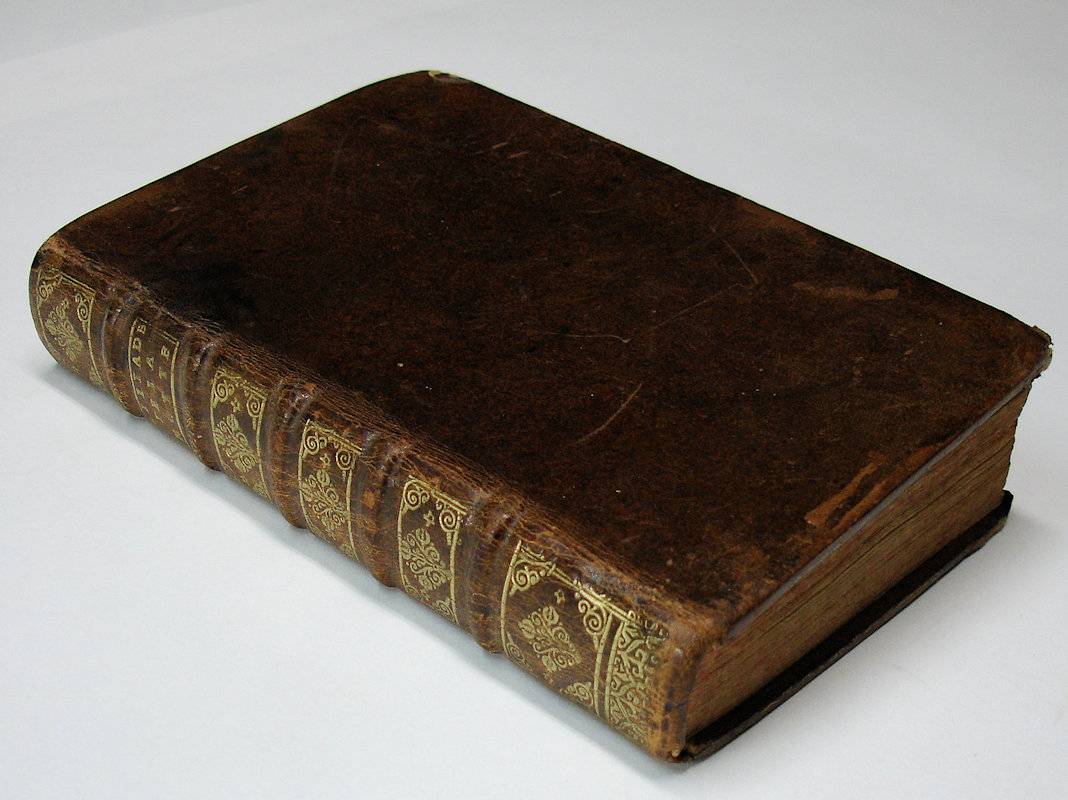HOMERUS.- LA MOTTE,A. HOUDART DE.
L'Iliade. Poëme, avec un discours sur Homère. Par Monsieur De la Motte, de l'Académie Françoise.
Paris, Chez Gregoire Dupuis, 1714.
8vo. Frontispiece, CLXXX,208,16,(8) p.; 12 full-page engravings. Contemporary calf 17 cm (
Ref: Hoffmann 2,345; Cioranescu 36534; Graesse 3,337; Ebert 100600) (
Details: Decorated gilt back with 5 raised bands. The frontispiece and engraved plates depict scenes from the Ilias; they were designed by Fr. Roettiers, Nattier, A. Dieu, & F. Delamonce, and executed by Edelinck & Chaufourier. Woodcut head-pieces) (
Condition: Binding scuffed, corners bumped. Leather of the turn-in of the lower board partly worn away. Flyleaves removed. A tiny strip of a few millimeters of the blank upper-margin of the title has been torn off, not affecting any text. The first gathering is slightly stained in the gutter. One small wormhole in the blank right upper corner of the first half of the book. Another small wormhole near the gutter of the blank left inner corner of the last half of the book) (
Note: The French classical scholar Anne Dacier, 1645-1720, published in 1699 a French prose translation of the Ilias of Homer. She wanted to rehabilitate the poet, who suffered from a bad reputation in France because of inferior translations, with a translation which would restore Homer's original lustre. It was thought that Homer's poetry was bad and implausible, and sometimes improper. The French author Houdar de la Motte, 1672-1731, took it upon himself to prune Homer, and produced a refashioned and civilized version of Madame Dacier's translation. He used her translation, because he didnot know any Greek. In 1714 he published his translation of the Ilias, reduced to 12 books. De la Motte condensed the Iliad by polishing away everything he thought silly, dull, cruel, tedious, or inappropiate to the taste and mind of a French gentleman. The fierce battle scenes, described by Homer in books X-XV, 4000 verses, were summarized in 400. Many lines were replaced by meaningless verses. In the introductory 'Discours' of 180 p. De la Motte elaborated on the principles of his translation. He is convinced that he restored with his pruned version the original beauty of Homer. The translation is prededed by a short Ode, 'L'Ombre d'Homère', in which the Frenchman conjures up the ghost of Homer, and asks him to show him the way in his undertaking. He tells Homer, 'Je veux sous un nouveau language,/ rajeunir ton antique ouvrage'. Homer simply has to tell him, 'Dis-moi comme il faut t'imiter'. (p. CLXXVI). The ghost of Homer asks De la Motte, 'Saufe-moi l'affront d'ennuyer' (p. CLXXVII), and orders him, 'Respecte le goût de ton âge'. He commissions him to create the poetry as he would have created, had he lived in France in his age. When the ghost disappears De la Motte concludes, 'Homere m'a laissé sa Muse,/ Et si mon orgueil n'en abuse,/ Je vais faire ce qui'il eût fait'. (p. CLXXX)) (
Collation: pi1, a-l8, m2; A-N8; A8, chi4) (Photographs on request)
Book number: 120263 Euro 275.00
Keywords: (Oude Druk), (Rare Books), Dacier, French translation, Greek literature, Griechische Literatur, Homer, Homerus, Iliad, Ilias, epic, epos
 HOMERUS. LA MOTTE,A. HOUDART DE.
HOMERUS. LA MOTTE,A. HOUDART DE.

